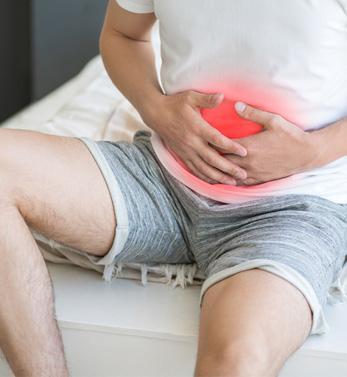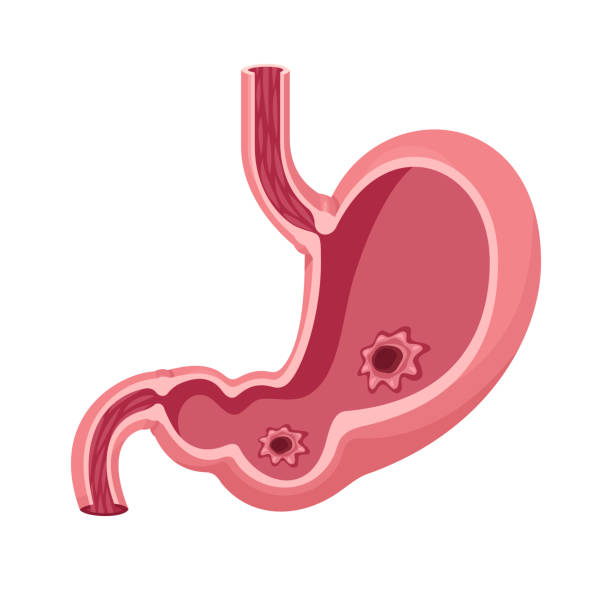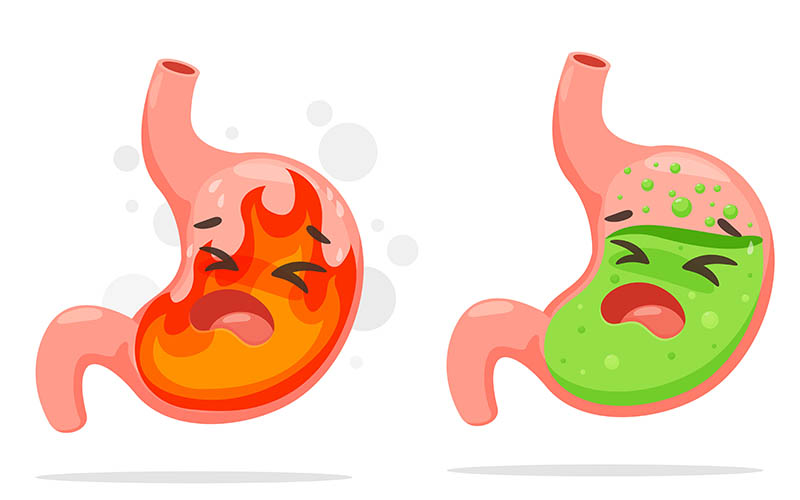

An ulcer is the destruction of the stomach or duodenum by irritating body fluids such as digestive juices and stomach acid, resulting in tissue loss.
Ulcer occurs as a result of the reduction of the mucus layer that protects the stomach and duodenum from digestive enzymes, and digestive acids damage these unprotected layers, causing bleeding, painful wounds, in other words ulcer formation.
With the effect of pepsin, which is one of the digestive fluids, tissue loss can spread to deeper points and cause the formation of wounds called inflammation. In our country, inflammations are more common in the duodenum than in the stomach.
Ulcers in the stomach are called gastric ulcers, and ulcers in the duodenum are called duodenal ulcers or bulbar ulcers, and they can range in size from approximately 3 millimeters to 5 centimeters. Ulcers in the stomach and duodenum are generally called peptic ulcers. The production and amount of stomach acid differs in each individual, but overproduction may occur in some people.

Peptic ulcer is the name given to open sores that develop for various reasons on the inner surface of the stomach and upper part of the small intestine. The most common symptom of an ulcer is constant stomach pain.
The most common cause of ulcers is infection with the Helicobacter pylori bacteria. Long-term use of some drugs can also cause ulcers. A stressful life and spicy foods do not directly cause ulcers, but they can worsen an individual's symptoms.
Ulcer is the most common of the digestive system diseases. It is not given much importance in our society, but since it is not a self-curable disease, necessary actions should be taken as soon as possible. Because over time, it can cause great problems in the digestive system.
Who Gets Ulcer?
In our country, duodenal ulcer is more common than stomach ulcer. Ulcer is 3 times more common in men than in women.
While duodenal ulcer is more common in men between the ages of 30 and 50, stomach ulcers are more common in women around the age of 60.
What are the types of ulcers?
It can be divided into two general types, gastric ulcer if the ulcer occurs inside the stomach and duodenal ulcer if it occurs in the upper part of the small intestine.
In rarer cases, the ulcer can cause more serious signs and symptoms, such as unexplained weight loss, nausea or vomiting, darkened blood or black stools in the stool, changes in appetite, vomiting, red or black vomit, feeling faint, and difficulty breathing.
What are the Causes of Ulcer?
While the stomach fulfills its duties in digestion, it also protects itself through the mucosal defense systems and prevents it from being damaged. As a result of some imbalances, reflux, gastritis, peptic ulcer and even stomach cancer may occur. There are also some factors that cause ulcers to occur.
It is a bacterium called "helicobacter pylori" that causes mechanical and physiological effects in the human body. The presence of this bacterium in duodenal ulcers was found to be approximately 100%. However, since it is the case in people with Helicobacter pylori but no ulcer, it has been concluded that other factors cause ulcers. It is known to cause ulcers as well as gastritis and stomach cancer.
In addition, smoking, alcohol consumption, some drugs used, unbalanced and unhealthy diet, excessive salt consumption, chewing food less and for a short time, staying hungry for a long time, overfilling the stomach, insomnia problem, fatigue due to intense pace, not paying attention to hygiene in food Causes such as genetic factors, stress factor, cortisone-containing drugs, excessive caffeine consumption can be counted among the factors that cause ulcers.
Looking at the studies, it has been observed that the frequency of peptic ulcer and gastric bleeding increases in individuals when natural disasters occur. It has been observed that the same problem was suffered during the years of economic depression.
 What are the Complications that May Occur with Ulcer?
What are the Complications that May Occur with Ulcer?
Peptic ulcer, if left untreated, can lead to various medical complications. These include primarily internal bleeding. Internal bleeding may present as slow blood loss leading to anemia or severe and rapid blood loss that may require hospitalization or blood transfusion. Signs of severe blood loss may include black or bloody vomit or black or bloody stools.
A hole, ie perforation, may occur in the wall of the stomach or the wall of the small intestine. This leads to the risk of serious and severe infection in the abdominal cavity of the individual.
The ulcer can prevent the passage of food from the digestive system, causing the individual to feel full, vomiting, swelling due to inflammation or indigestion due to scar tissue formation in the stomach, causing involuntary weight loss. In addition to all these, medical studies have shown an increased risk of stomach cancer in individuals who have developed ulcers, especially in individuals infected with H. pylori.
How to Prevent Ulcer?
It is possible to take a few steps to prevent the ulcer from developing. Accordingly, the individual's protection from bacterial infections, washing his hands frequently with soap and water, and consuming only fully cooked food can prevent H. pylori-induced ulcers. Individuals who regularly use pain relievers and medications that increase the risk of ulcers should take steps to reduce the risk of stomach problems, such as taking the medication with food.
The individual should consult their doctor or a medical professional to find the lowest dose possible to relieve the pain they are feeling and should avoid drinking alcohol at the same time as taking medication. The combination of medication and alcohol will increase the risk of stomach upset.
Ulcer Treatment
After the diagnosis of ulcer is made with clinical, laboratory and imaging tests, drugs that suppress helicobacter pylorimide acid are used. If the bacteria are still present, antibiotic treatment for the infection is started.
With ulcer medications, it is aimed to reduce stomach acids and reduce the person's complaints. Removing the effect of stomach acid on the ulcer triggers healing.
The method applied other than drug therapy is cutting the vagus nerve, which stimulates the nerves in order to prevent acid and pepsin secretion. However, cutting it does not eliminate the risk of recurrence. In some cases of ulcers, serious complications may develop and surgical operation may be required. Existing ulcers can be chronic and recurrent, which significantly impairs the person's quality of life.
Ulcer Diet
An ulcer diet is used as a part of ulcer treatment. Foods that trigger heartburn, all kinds of foods and drinks that increase gastric secretions should definitely not be in your life during this period. If sour, onion, spicy, spicy foods trigger your heartburn complaints, you should have a diet away from these foods.
Smoking promotes ulcer formation. Therefore, the healing process may be prolonged in people who smoke. Likewise, alcohol intake makes it difficult to treat stomach diseases as it impairs the mucosal resistance. Alcohol consumption should be strictly avoided, especially in acute ulcers.
 What Are the Dangerous Consequences of Ulcer?
What Are the Dangerous Consequences of Ulcer?
Bleeding: Ulcer is the most common cause of bleeding in the upper digestive tract. Sometimes it can occur even in people who do not show any symptoms. The stool of people who experience bleeding is close to black, and the gastric fluid that comes with vomiting is observed as brown. Even if there is no other symptom, if black stools are present, you should apply to the health institution urgently.
Gastric Perforation: An increase in the depth of the existing ulcer indicates the perforation of the layers of the stomach and duodenum. As a result of the stomach acid reaching the abdominal cavity, severe pain is experienced and the abdomen becomes hard and the mobility is very limited. Treatment is usually possible with surgery.
What Is Good For Ulcer Pain? What Should Be Done to Prevent Ulcer?
A healthy, planned, programmed diet
Avoiding fried, excessively sugary, salty, fatty foods as much as possible
Abundant fluid consumption
Reducing consumption of tea and coffee, as excessive caffeine consumption can trigger ulcers.
Consuming light, steamed meals
Less frequent servings
Not neglecting snacks in order to prevent your stomach from being empty for a long time
Lifestyle Changes And Home Care For Ulcers
There are a few steps that an individual can take spontaneously to get rid of stomach ulcers. Accordingly, the individual may consider changing the painkillers they use.
Even if stress does not cause the ulcer, it can worsen the signs and symptoms of an ulcer. The individual should reduce the source of his stress and do his best to address its causes. Some stress may be unavoidable, but it may be possible to avoid it by doing regular light exercise, spending time with friends or writing in a journal.
Smoking can make your stomach more susceptible to ulcer development by interfering with the stomach's protective lining, and it also increases stomach acid. Therefore, not smoking is an important step. Similarly, alcohol consumption should be limited. Excessive alcohol use can irritate and erode the mucous membrane of the individual's stomach and intestines, causing inflammation and bleeding.
Products containing bismuth may help with ulcer symptoms. Some medical evidence has been observed that zinc can help heal ulcers. However, before using such supplements, a doctor should always be consulted and it should be learned whether they will interact negatively with the drugs used.